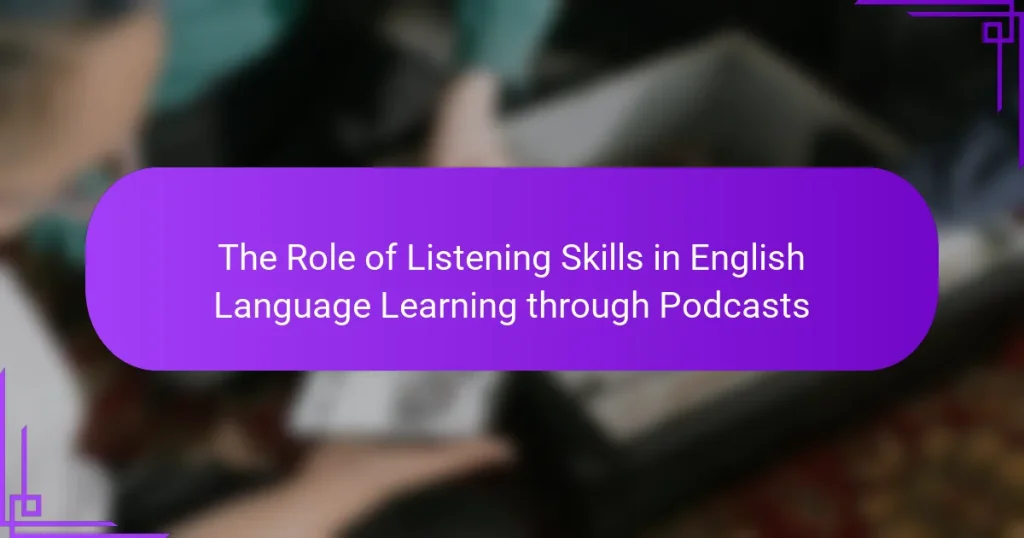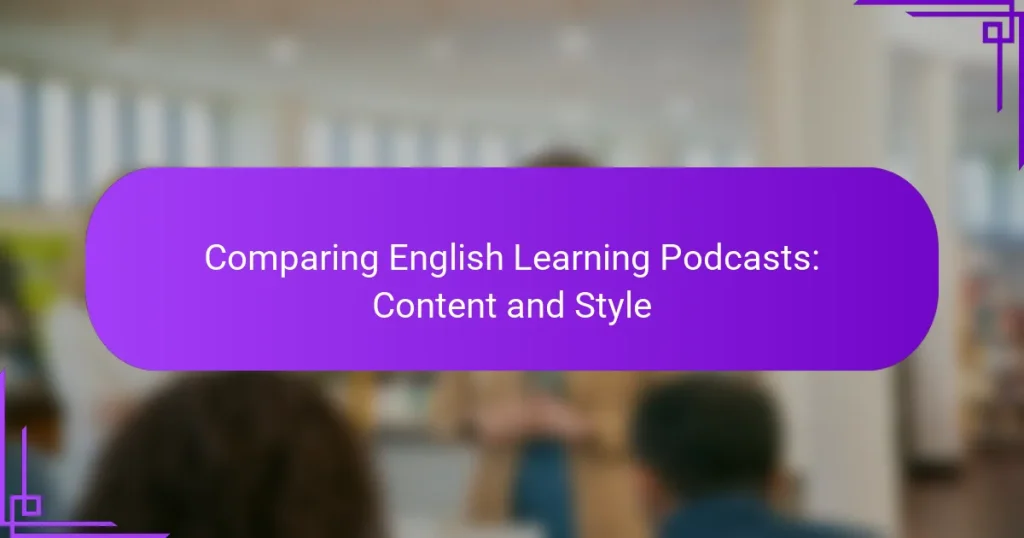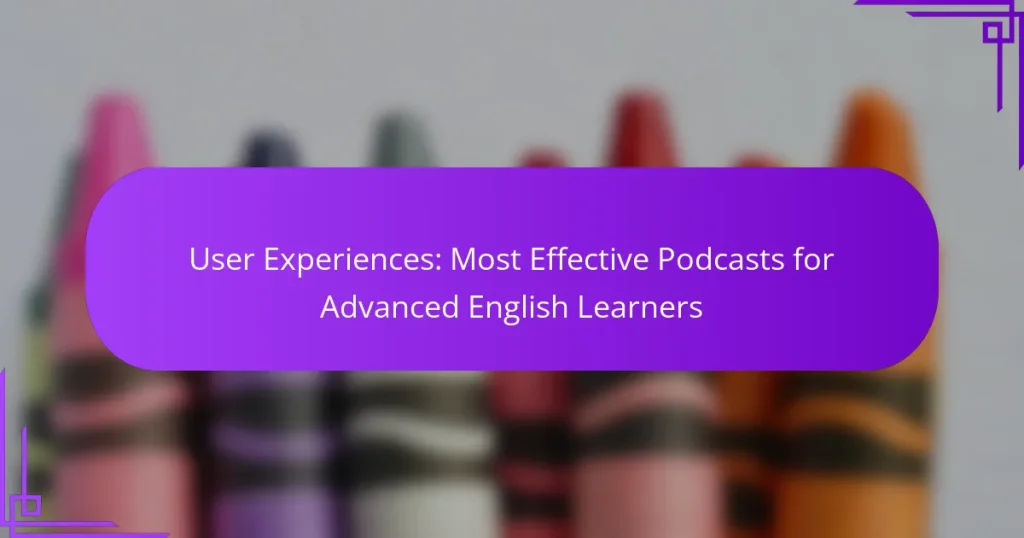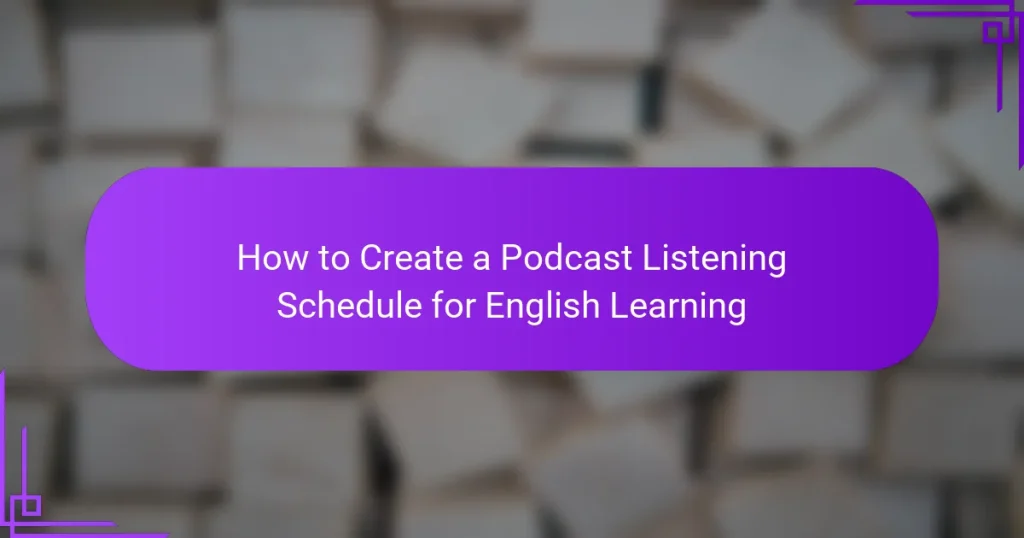Podcasts are a powerful tool for enhancing English learning, offering immersive listening experiences that improve comprehension and fluency. With engaging content tailored to various proficiency levels, learners can easily find podcasts that suit their needs and learning styles. By consistently listening and actively engaging with the material, students can effectively expand their vocabulary and grasp the nuances of real-world language use.
How to Incorporate Podcasts into Your Daily English Learning Routine
Podcasts for Learning English Slang and Idioms: A Guide
Comparing English Learning Podcasts: Content and Style
User Experiences: Most Effective Podcasts for Advanced English Learners
7 Best Podcasts for Learning English While You Travel
How to Create a Podcast Listening Schedule for English Learning
How can podcasts improve English learning?
Podcasts can significantly enhance English learning by providing immersive listening experiences that develop comprehension and fluency. They offer real-world language use, making it easier for learners to grasp nuances and context.
Enhanced listening skills
Listening to podcasts helps learners improve their auditory processing and comprehension skills. Regular exposure to spoken English allows learners to become accustomed to different speech patterns and speeds, which is crucial for effective communication.
To maximize this benefit, choose podcasts that match your current proficiency level. Gradually increase the difficulty as your skills improve, ensuring that you are consistently challenged without feeling overwhelmed.
Exposure to diverse accents
Podcasts often feature speakers from various regions, exposing learners to different English accents and dialects. This exposure is vital for understanding the global nature of the language and prepares learners for real-life conversations with people from diverse backgrounds.
Consider selecting podcasts that highlight speakers from different countries, such as the UK, Australia, and the US. This variety will help you adapt your listening skills to various pronunciations and colloquialisms.
Contextual vocabulary acquisition
Podcasts introduce vocabulary in context, making it easier for learners to understand and remember new words. Hearing words used in sentences helps reinforce their meanings and appropriate usage.
To enhance vocabulary retention, take notes while listening and jot down unfamiliar words. Later, look up their definitions and try to use them in your own sentences or conversations.
Engagement through storytelling
Many podcasts utilize storytelling to convey information, making the learning process more engaging. Stories capture attention and create emotional connections, which can enhance memory retention.
Seek out narrative-driven podcasts that align with your interests. This will not only improve your language skills but also keep you motivated to continue learning.
Flexible learning schedule
Podcasts offer the flexibility to learn at your own pace and on your own schedule. You can listen during commutes, workouts, or while doing household chores, making it easy to incorporate language practice into your daily routine.
To make the most of this flexibility, create a listening schedule that fits your lifestyle. Aim for consistency, even if it’s just a few episodes a week, to build a habit of regular practice.
What are the best podcasts for learning English?
The best podcasts for learning English offer engaging content that enhances listening skills and vocabulary. They cater to various proficiency levels, making it easier for learners to find suitable options that fit their learning style.
ESL Pod
ESL Pod is designed specifically for English language learners, featuring slow-paced conversations and clear explanations of vocabulary and grammar. Each episode typically focuses on a specific theme, making it easier to follow along and absorb new language concepts.
Listeners can benefit from the accompanying transcripts, which help reinforce learning by allowing them to read along while listening. This dual approach enhances comprehension and retention of new words and phrases.
EnglishClass101
EnglishClass101 offers a wide range of audio and video lessons tailored to various skill levels. The podcast covers everyday topics, cultural insights, and practical language use, making it relevant and interesting for learners.
With a subscription, users gain access to additional resources, including lesson notes and quizzes. This can significantly enhance the learning experience by providing structured practice and reinforcement of concepts discussed in the podcasts.
The English We Speak
The English We Speak focuses on idiomatic expressions and phrases commonly used in everyday English. Each episode is short, typically around three minutes, making it easy to fit into a busy schedule.
This podcast is particularly useful for learners looking to sound more natural in conversation. By understanding and using these expressions, learners can improve their fluency and comprehension in real-life situations.
All Ears English
All Ears English emphasizes conversational English and cultural nuances, making it ideal for learners who want to improve their speaking skills. The hosts discuss various topics, from language tips to cultural observations, providing a well-rounded learning experience.
Listeners are encouraged to engage with the content by practicing speaking and reflecting on the discussions. This interactive approach helps reinforce learning and builds confidence in using English in social settings.
BBC Learning English
BBC Learning English offers a comprehensive range of resources, including podcasts that cover news, grammar, and vocabulary. The content is produced by experienced educators, ensuring high-quality material that is both informative and engaging.
With various series targeting different aspects of the language, learners can choose specific topics that interest them. This flexibility allows for a personalized learning experience that can adapt to individual goals and preferences.
How to integrate podcasts into English learning?
Integrating podcasts into English learning involves consistent listening, active engagement, and collaborative discussions. By incorporating these elements, learners can enhance their comprehension and vocabulary effectively.
Daily listening practice
Daily listening practice is crucial for improving language skills. Aim for at least 20-30 minutes of podcast listening each day to build familiarity with pronunciation and intonation. Choose podcasts that match your proficiency level to ensure comprehension while still challenging yourself.
Consider setting a specific time for your listening sessions, such as during your commute or while exercising. This routine helps reinforce learning and makes it easier to stay committed.
Active note-taking techniques
Active note-taking enhances retention and understanding. While listening, jot down key phrases, new vocabulary, and interesting ideas. Use a dedicated notebook or a digital tool to organize your notes effectively.
Try different note-taking methods, such as the Cornell method or mind mapping, to find what works best for you. Reviewing your notes after each session can solidify your learning and highlight areas for further study.
Discussion with peers
Engaging in discussions with peers can deepen your understanding of podcast content. Form study groups or language exchange partnerships where you can share insights and ask questions about the material you’ve listened to.
Consider scheduling regular meetings to discuss episodes and practice speaking. This collaborative approach not only reinforces your learning but also builds confidence in using English conversationally.
Creating vocabulary lists
Creating vocabulary lists from podcasts helps reinforce new words and phrases. As you listen, compile a list of unfamiliar terms along with their meanings and example sentences. This practice can enhance your vocabulary significantly over time.
Review your vocabulary lists regularly, and try to use new words in your writing and speaking. Flashcards or digital apps can also be effective tools for memorizing vocabulary and tracking your progress.
What are the criteria for selecting educational podcasts?
When selecting educational podcasts for learning English, consider factors such as content relevance, host expertise, and listener engagement. These criteria ensure that the podcasts are not only informative but also enjoyable and effective for language acquisition.
Content relevance
Content relevance refers to how well the podcast topics align with your learning goals. Choose podcasts that focus on themes or subjects you are interested in, such as culture, business, or everyday conversations. This alignment keeps you motivated and engaged.
Additionally, look for podcasts that cater to your current language level. For beginners, podcasts that use simple vocabulary and clear pronunciation are ideal, while more advanced learners might benefit from discussions that include idiomatic expressions and complex grammar.
Host expertise
The expertise of the podcast host plays a crucial role in the quality of the educational experience. Hosts with a background in language teaching or linguistics can provide valuable insights and explanations that enhance your understanding. Their ability to articulate concepts clearly is essential for effective learning.
Moreover, consider the host’s fluency in English and their accent. A clear and neutral accent can help you better understand spoken English, especially if you are new to the language.
Listener engagement
Listener engagement is an important factor that can significantly impact your learning experience. Podcasts that encourage interaction, such as Q&A sessions or listener feedback segments, can make the learning process more dynamic and participatory.
Look for podcasts that incorporate quizzes, discussions, or prompts that invite you to think critically about the material. Engaging with the content actively reinforces learning and helps you retain new vocabulary and concepts more effectively.
How do podcasts compare to traditional learning methods?
Podcasts offer a flexible and engaging alternative to traditional learning methods, allowing learners to absorb English in a more conversational context. Unlike textbooks or classroom settings, podcasts can be accessed anytime and anywhere, making them a convenient choice for busy individuals.
Benefits of using podcasts for learning English
Podcasts provide exposure to natural language use, including slang and idiomatic expressions, which are often absent in formal education. They can enhance listening skills and pronunciation through diverse accents and speech patterns. Additionally, the variety of topics available allows learners to choose content that interests them, increasing motivation and retention.
Another advantage is the ability to learn at one’s own pace. Learners can pause, rewind, or replay episodes as needed, which is particularly beneficial for complex subjects or unfamiliar vocabulary. This self-directed approach fosters a deeper understanding of the material.
Challenges of using podcasts for learning English
While podcasts are beneficial, they also come with challenges. One major issue is the lack of structured learning, which can lead to gaps in knowledge if learners do not supplement their listening with other resources. Additionally, some podcasts may use advanced vocabulary or fast-paced speech that can be difficult for beginners to follow.
Another challenge is the potential for distraction. Listening to podcasts in noisy environments or multitasking can hinder comprehension. It’s essential to find a quiet space and focus on the content to maximize learning outcomes.
Tips for effectively using podcasts in your English learning journey
To make the most of podcasts, start by selecting shows that match your current skill level and interests. Look for podcasts specifically designed for English learners, as they often feature slower speech and clearer explanations. Gradually progress to more advanced content as your skills improve.
Consider taking notes while listening to reinforce learning. Jot down new vocabulary, phrases, or interesting points to review later. Engaging with the material actively can significantly enhance retention and understanding.
Lastly, try to incorporate podcasts into a broader learning routine. Pair listening with speaking practice, reading, or writing exercises to create a well-rounded approach to language acquisition. This combination will help solidify your learning and improve overall proficiency.






